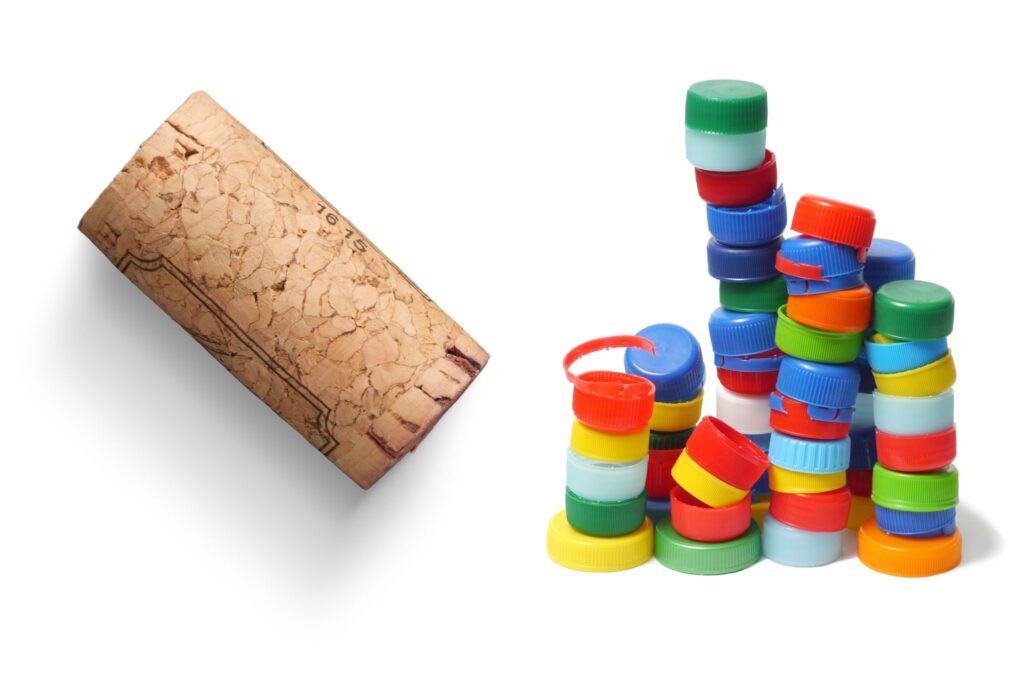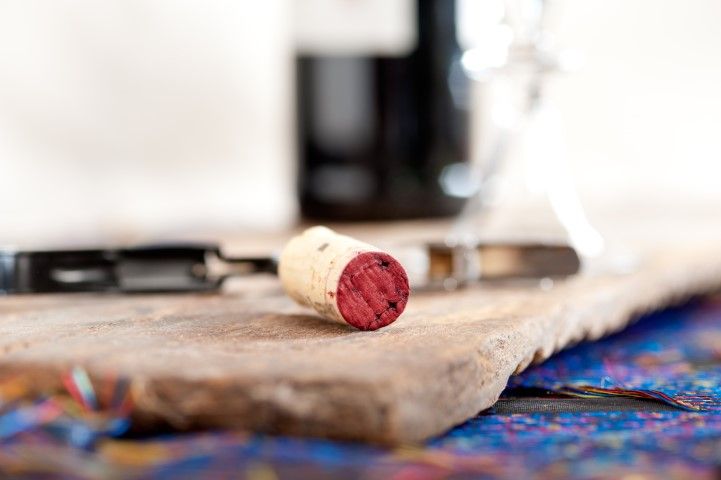We all enjoy uncorking a bottle of wine, opening a bottle of vermouth, and having an aperitif after a hard day’s work; this is part of our culture and is fundamental. But have you ever wondered what’s the best way to close the bottles? Cork or screw cap?
At Excellent Cork, as experts in the manufacturing of synthetic corks, we constantly face this dilemma. That’s why we’ve written this article to tell you the advantages and disadvantages of both systems, and we’ll let you decide for yourself.
Interested? Let’s get started.
What is cork and screw cap?
Cork is made from a natural material that is widely used as a sealing method for bottles. It comes from the bark of the cork oak and is known for its elasticity and airtightness. Cork stoppers have been used for centuries in the wine and beverage industry and are commonly associated with quality and tradition in packaging.
On the other hand, the screw cap is a more modern and convenient sealing method. It consists of a metal cap with a thread inside that screws onto the neck of the bottle. This cap is often used and provides an airtight seal that is easy to open and close, making it perfect for various products, from water to medicine.
Both sealing methods have their distinctive characteristics and advantages, which we will explore in the following sections.
Advantages of Cork
As a bottle closure method, the cork stopper has been the preferred choice for centuries. Why?
- Allows the wine to breathe: It’s porous, allowing the wine to breathe gradually, facilitating its aging and the development of complex flavors.
- Tradition and prestige: They are associated with tradition and quality in the wine industry, which can add a touch of prestige to the bottle’s presentation.
- Aesthetics: It offers an attractive visual presentation in the bottle, with its natural texture and classic appearance.
- Biodegradability: Being a natural material, cork is biodegradable, making it a more environmentally friendly option compared to some synthetic stoppers.
Disadvantages of Cork
Despite its many advantages, cork stoppers also have some limitations that are important to consider:
- Possible contamination: It may contain substances like TCA (trichloroanisole), which can contaminate the wine and cause unwanted aromas and flavors, known as “cork taint.”
- Variability in quality: Due to its organic nature, it can present variations in quality and performance, which can lead to sealing problems or premature deterioration.
- Cost: Compared to other sealing methods, it can be more expensive, which may impact the final price of the bottled product.
- Need for a corkscrew: Opening a bottle sealed with cork requires the use of a corkscrew, which can be an issue in certain cases.
Advantages of Screw Cap
Screw caps for bottles, as an alternative to cork, offer a series of advantages that make them attractive to many producers and consumers.
For example:
- Airtight seal: It provides an airtight seal that helps preserve the freshness and quality of the bottle’s content, preventing oxidation and contamination.
- Ease of use: It’s quick and easy, as it doesn’t require additional tools like a corkscrew. This makes it a perfect option, especially in informal or outdoor situations.
- Consistency in performance: Unlike cork stoppers, which may present variability in quality, screw caps offer more consistent performance in terms of sealing and durability.
- Lower risk of contamination: It eliminates the risk of contamination by TCA and other unwanted compounds, ensuring a more consistent and defect-free tasting experience.
Disadvantages of Screw Cap
Screw caps for wine offer several advantages but also have some disadvantages that need to be considered:
- Perception of quality: Some consumers associate it with lower-quality products.
- Aesthetic limitations: It lacks the traditional and aesthetic appearance associated with cork stoppers.
- Compatibility with certain wines: Especially those intended for prolonged aging, which may benefit more from the micro-oxygenation provided by cork.
- Environmental impact: Although recyclable, its manufacturing and disposal may have a greater environmental impact.
Which is better? Cork or screw cap?
The eternal question of which is the best option has no definitive answer. For centuries, cork has been the preferred method for sealing wine bottles and other select products. Its ability to allow controlled micro-oxygenation and its association with quality and tradition are aspects that make it stand out. However, we recognize that the screw cap offers practical advantages, such as an airtight seal and easy opening.
The choice between one or the other depends on the specific product and the consumer’s needs.
Although at Excellent Cork, we tend to favor cork stoppers, we recognize that the screw cap is very practical.
Which do you prefer?
Frequently Asked Questions
What is the difference between cork and screw cap?
The main difference lies in the material and sealing method. Cork is a porous natural material, while the screw cap is metal and screws onto the bottle’s neck.
Which is better for preserving wine, cork or screw cap?
Both methods can be effective for preserving wine, but the choice depends on factors such as the type of wine and the consumer’s preferences.
Does the choice between cork and screw cap affect the wine’s flavor?
The choice of sealing method can influence the wine’s development during storage, but the impact on flavor depends on several factors and is difficult to generalize.
Is the screw cap more effective at preventing wine contamination?
The screw cap provides an airtight seal that can help prevent wine contamination, but cork can also be effective if it is free of defects like TCA.
Does the choice between cork and screw cap depend on the type of wine?
Yes, the choice of sealing method may depend on the type of wine and its specific characteristics, as well as the preferences of the producer and consumer.
Which sealing method is more eco-friendly, cork or screw cap?
Both methods have different environmental impacts. Cork is biodegradable and renewable, while the screw cap is recyclable but may require more resources in its production. The “most eco-friendly” choice may depend on several factors and is subjective.





